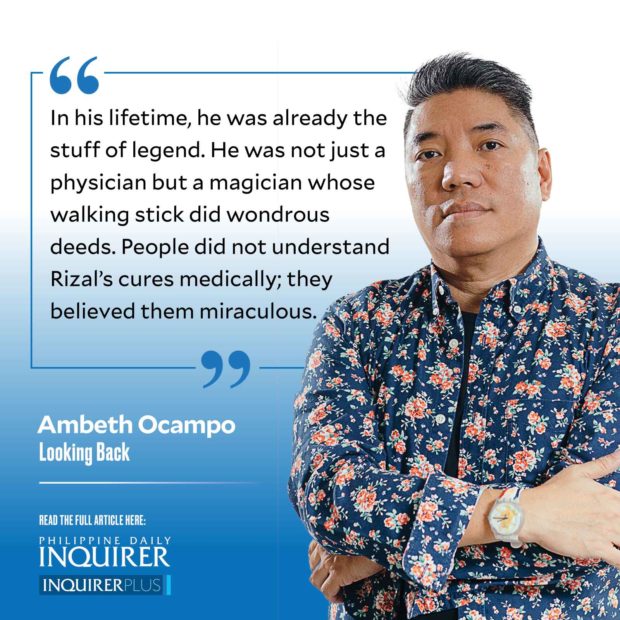Rizal and ‘tsismis’
Urban legends are like amoeba: They divide and multiply. The urban legend about Rizal being the father of Adolf Hitler, for example, is easily dispatched by counting back nine months, from April 20, 1889, from the birth of Alois Schicklgruber. Nine months before Hitler was born in the town of Braunau am Inn, Austria, Rizal was researching in the British Library in London. If you think that the Rizal-Hitler association is dispelled by logic, reason, or plain common sense, you will be surprised that it spawned another urban legend—that Rizal is Jack the Ripper. The Ripper murders were accomplished with a sharp knife, probably a scalpel, that indicated the murderer was a doctor, or had medical training. Rizal fit that to a tee. Rizal was known to frequent an area where one of the victims was found. He was in London when the murders occurred, and when he traveled to Paris to have his second book—an annotated edition of the 1609 “Sucesos de las islas Filipinas”—published, the Ripper murders stopped. One of my bright students even said that we have missed the biggest clue of them all—Jose Rizal and Jack the Ripper share the same initials—J.R.
I grew up on Rizal fables now since disproven: throwing his slippers in the river to be found and be useful to someone else downstream; that he invented champorado by accidentally spilling a cup of chocolate into his breakfast of tuyo (sardinas secas) and rice; that he said anyone who doesn’t appreciate his native language is worse than a beast or a stinking fish (masahol pa sa hayop at malansang isda), etc. But in his lifetime, he was already the stuff of legend. He was not just a physician but a magician whose walking stick did wondrous deeds. People did not understand Rizal’s cures medically; they believed them miraculous. Instead of knowing that Rizal was one of the few trained ophthalmic surgeons in Southeast Asia at the time, they saw him as someone Christ-like for giving sight to the blind.
When he returned home to Calamba after his medical studies abroad, a Spanish bodyguard was assigned to him, not so much to protect him but to keep an eye on him as a suspected German spy. During an ascent to Makiling, he raced with his Spanish bodyguard and planted a flag at the summit. Rumor was that he planted a German flag and claimed the islands for Bismarck! Spanish authorities in Manila had an overactive imagination: If they asked Rizal directly about being a German spy, he would have told them, truthfully and with a hearty laugh, that when he was traveling in Germany, the police placed him under surveillance and actually threatened him with deportation as a French spy!
Tsismis hogged Rizal in life, more so in death. A document I found in the Philippine National Archives, dated March 29, 1897 (three months after Rizal’s execution), informed the governor-general that there were rumors circulating in Manila and its suburbs that Rizal did not die in Bagumbayan—that he was miraculously alive. It reported that after Rizal was shot, his body was covered by a rose-colored cloud that accompanied the corpse in a carriage to Paco. Upon arrival at the cemetery, the carriage was opened. Rizal’s corpse had turned into a beautiful white rooster that flew to Cavite, where it joined the soul of Fr. Jose Burgos executed in 1872. Another story was that Rizal’s corpse moved from place to place within Paco cemetery.
Well, social media has been feeding a new urban legend that says Rizal did not die by firing squad in Bagumbayan on Dec. 30, 1896. In this alternative history, aimed at a captive audience of 31 million Filipinos, Rizal lived to the ripe old age of 113 years. He traveled the world, advised world leaders, including popes, and amassed a fortune in gold that he left to Ferdinand E. Marcos before his death. This absurd tale, told and retold on YouTube, reminded me of an entry in Rizal’s journal, dated Sept. 29, 1896, where the hero complained about “… fanciful stories about me. I’m going to become a legendary personage. Friends and enemies invent fabulous stories that elevate me and improbable stories to harm me, and they find people who are considered educated to believe them.”
—————-
Comments are welcome at aocampo@ateneo.edu

















